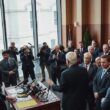The head of the Council of Economic Experts, Monika Schnitzer, has voiced concerns regarding a potential breakdown of the intergenerational contract and indicated support for increased financial contributions from wealthier retirees, a proposal previously put forward by the German Institute for Economic Research (IDW) under the label “Boomer-Soli.
Schnitzer, in an interview with “Focus Money” magazine, acknowledged a degree of merit to the proposal, explaining that a critical examination of the current system is needed. She attributed the strain on the system to the historical trend of lower birth rates among the Baby Boomer generation, which has resulted in a shrinking workforce supporting an increasing number of retirees. This demographic shift necessitates higher contributions from the working population, a situation she deemed unsustainable. Consequently, Schnitzer advocates for reform of the pension insurance system.
However, Schnitzer clarified that the “Boomer-Soli” alone is not a complete solution. The Council of Economic Experts has proposed a multi-faceted approach including extending working lives, encouraging individual pension savings and moderating the rate of pension increases. This would not involve pension cuts, but rather limit the rate at which pensions rise in the future.
Schnitzer expressed concerns that lower-income earners could ultimately see their pensions fall short of their needs. Addressing this potential issue would, in her view, require a redistribution of wealth. She questioned why wealthier members of the Baby Boomer generation shouldn’t contribute toward resolving the problem, particularly given their role in the demographic imbalance. According to Schnitzer, the Baby Boomer generation has, to some degree, failed to uphold their side of the intergenerational agreement by having fewer children who would have contributed to funding their own eventual pensions.





